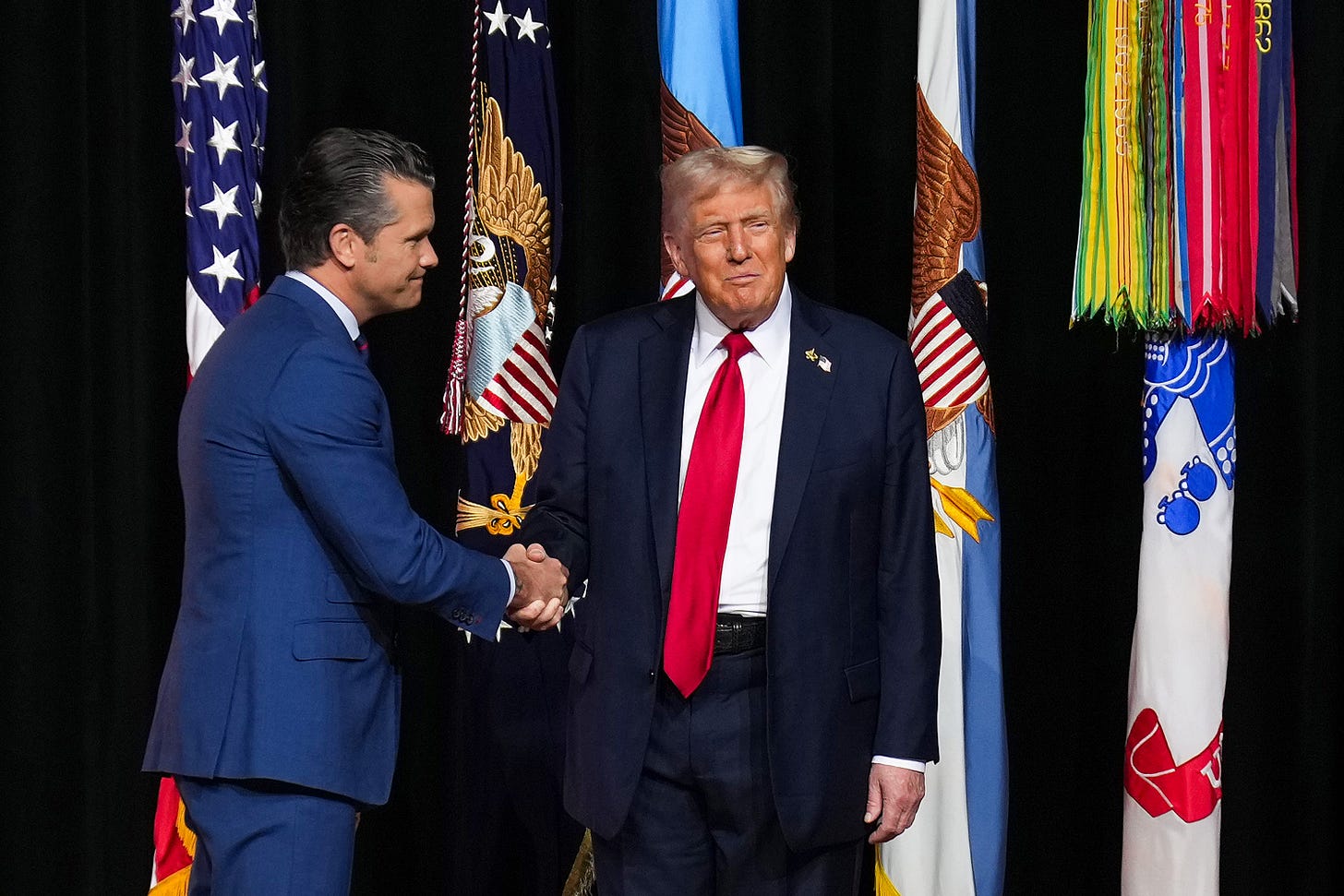Trump attempts a major step toward dictatorship
He's going for it. Who will stop him?
PN is supported by paid subscribers. Become one ⬇️
Defense Secretary Pete Hegseth on Tuesday delivered a speech to the nation’s top generals and admirals that laid out his plans to re-envision the military as a ruthless fighting force that has no place for rules and norms like equal opportunity for women or even tolerance for “fat generals.”
“You kill people and break things for a living,” Hegseth said. “You are not politically correct and don’t necessarily belong, always, in polite society.”
Hegseth went on to say that the military would no longer be restrained by “stupid rules of engagement” — including, apparently, at home.
That chilling speech was followed by an even scarier one from Trump himself. After encouraging the conspicuously silent assembly of military leaders to applaud for him if they felt so inclined, Trump laid out a lawless, authoritarian vision for the armed forces, including fighting a “war from within” against his domestic enemies.
In other words, boots on the ground — in places like Portland, not Pyongyang.
“Our history is filled with military heroes who took on all enemies foreign and domestic,” Trump told the generals and admirals in attendance. “That’s what the oath says — foreign and domestic. Well, we also have domestic.”
Trump went on to suggest that active-duty troops should train for combat in places like Chicago. The president also told the nation’s top brass that some US cities should be considered hostile territory.
“They’re very unsafe places and we’re gonna straighten them out one by one,” Trump said of US cities, singling out San Francisco, Chicago, New York, and Los Angeles. “This is gonna be a major part for some people in this room. That’s a war too. It’s war from within.”
If all that weren’t enough, Trump touted an executive order that created a National Guard strike force the administration is standing up to respond to events of civil unrest, telling military leaders that it will “be a big thing for the people in this room, because it’s the enemy from within and we have to handle it before it gets out of control.”
“It won’t get out of control once you get involved at all,” Trump added.
Trump has long desired to send military troops to Democratic cities — an authoritarian aspiration that is accompanied by his fantasy of having soldiers shoot protesters. (Hegseth has signaled willingness to have soldiers kill Americans.)
The president and his former Fox News host defense secretary already made their wish for domestic deployment of soldiers a reality when, in June, Hegseth ordered Marines to be deployed to Los Angeles to assist immigration agents in enforcement operations there. Trump federalized members of the California National Guard in his military push into LA, prompting a federal judge to declare that the administration had violated the Posse Comitatus Act, which prohibits the military from engaging in domestic law enforcement.
Now, the Trump administration has again federalized a state’s National Guard, this time in Oregon, and the president plans to send 200 Guard members to Portland. The state’s attorney general has sued, alleging that the federalization of Guard members violates US law, which only allows the president to deploy the Guard if the nation “is invaded or is in danger of invasion by a foreign nation,“ if “there is a rebellion or danger of a rebellion” against the government, or the president is “is unable with the regular forces to execute” federal law.
Oregon’s lawsuit notes that Trump is prevented from using Guard troops by the Posse Comitatus Act, which the administration has already violated. The lawsuit also alleges that the Trump administration is attempting to violate the Tenth Amendment, which generally limits the federal government’s authority.
“Our nation’s founders recognized that military rule — particularly by a remote authority indifferent to local needs — was incompatible with liberty and democracy,” the lawsuit states.
A hearing is scheduled for Friday in which a federal judge will decide whether to halt Trump’s federalization of Guard members for deployment to Portland. Meanwhile, a general in the Oregon National Guard has written a letter to his members reminding them that, when deployed, they will answer to US Northern Command — not Guard leadership or the Oregon governor.
“I know some of you may have strong feelings about this mission. That’s okay. You are citizens first, but you’re also service members who took an oath to support and defend the Constitution and follow the orders of the President and the Governor,” Brig. Gen. Alan Gronewald wrote in a letter reported by Fox News. “That oath doesn’t come with an asterisk that says, ‘only when I agree with the mission.’”
The situation in Portland — like Trump’s military incursion into Los Angeles in June — is an example of how the Trump administration pushes the boundaries of law and exploits the slow, deliberative judicial process that acts as a check on the president’s power. It wasn’t until early September that a federal judge determined Trump’s June deployment of the military in LA violated the Posse Comitatus Act.
In Oregon, the Guard has been tasked with protecting federal property and law enforcement in Portland, like the ICE facility that has long been the subject of protests there. But if Guard members engage in what is considered domestic law enforcement operations — even something as anodyne as directing traffic for local police — they could be deemed in violation of the Posse Comitatus Act, as Judge Charles Breyer found in the wake of the Los Angeles offensive.
If US District Judge Michael Simon — an Obama appointee who is overseeing the Oregon case — decides on Friday to allow the National Guard to move into Portland, Americans will effectively have to wait and see if the Guard violates the Posse Comitatus Act or otherwise pushes the boundaries of what they’re legally allowed to do.
But by then, the damage will have already been done: Trump will have again violated federal law, not to mention the historic norms that have largely prevented domestic deployment of the military. With the courts either playing catchup to lawless, norm-destroying actions, or approving of these actions through decisions like the broad presidential immunity ruling handed down from the Supreme Court in 2024, impeachment will be all that remains between Trump and total power.
But the courts still have some tools at their disposal to hold the Trump administration in check — and some federal judges may be getting closer to employing them. On Monday, US District Judge Royce Lamberth, a Reagan appointee, criticized the Trump administration for “concerning disrespect” from Kari Lake’s US Agency for Global Media, which runs Voice of America, a government-funded media operation that has historically brought objective journalism to countries without a robust free press.
In ruling that Lake’s agency had improperly fired 500 Voice of America journalists, Lamberth said there was “serious doubt” that the agency had complied with a previous court order that Voice of America be allowed to continue producing content in line with its mission to “serve as a consistently reliable and authoritative source of news.”
“It is the Court’s view that the defendants’ disregard for its earlier orders to produce information would more than support a trial on civil contempt,” Lamberth wrote.
“We’ll see if the administration defies SCOTUS”
Civil and criminal contempt are two of the tools federal judges have to hold the Trump administration and Justice Department lawyers accountable as they challenge laws on nearly every conceivable front, Judge Ursula M. Ungaro, formerly of the US District Court for the Southern District of Florida who was appointed by George H.W. Bush in 1992, tells Public Notice.
Like Lamberth, Ungaro noted that the US Supreme Court — which has kicked numerous high-profile decisions back down to the lower courts — will eventually have to decide on what the law actually means when it comes to Trump’s powers, whether he’s trying to fire Voice of America journalists or send troops into American cities.
Absent those decisions from the nation’s highest court, federal judges like Lamberth risk “letting the government fill in the blanks of the Supreme Court’s emergency rulings, relinquishing the ‘basic judicial task’ of deciding what the law is,” Lamberth wrote on Monday.
Ungaro said that contempt rulings and sanctions against Justice Department lawyers might have to be employed if the Trump administration continues to flout court orders.
“In terms of the judges’ power, there is the contempt power, although there are other coercive vehicles that they can use” like sanctions, and simply the pressure of DOJ lawyers having to have good working relationships with judges, said Ungaro, a member of Keep Our Republic’s Article III Coalition of former federal judges who are raising the alarm about the independence of the judiciary. “Ultimately the Supreme Court is going to have to weigh in if the administration is that recalcitrant, and we’ll see if the administration defies the Supreme Court.”
Perhaps that would be enough to force impeachment proceedings against Trump. But so far, nothing the president has done has prompted a critical mass of Republicans to speak out about his abuses of power. In his address to military leaders on Tuesday and in comments throughout the last few days and weeks, Trump has explicitly said that he intends to go farther, using “full force” in Portland.
During his speech to military leaders, Trump relayed a conversation he said he had with immigration officers who had been attacked by protesters throwing projectiles at law enforcement vehicles.
“And I said, ‘Never let that happen again,’” Trump said. “From now on if that ever happens — and I say it here — you get out of that car and you can do whatever the hell you want to do.”
That’s it for today
We’ll be back with more tomorrow. If you appreciate today’s PN, please do your part to keep us free by signing up for a paid subscription.
Thanks for reading, and for your support.







Thank you for laying this out with such clarity. The trajectory you describe is chilling, but also familiar: history shows us that once cruelty and coercion are normalized as strategy, institutions rarely stop the slide in real time. Courts, like you note, are slow and deliberative by design, and authoritarians exploit that lag.
I’m not writing here out of faith that this will be stopped anytime soon.
I’m analyzing the behavior, because the pattern is what matters: the steady erosion of norms, the reframing of domestic dissent as “the enemy within,” and the way fear is used to make compliance seem rational. History tells us this is how regimes consolidate power…not all at once, but step by step, until silence feels safer than speech.
Your piece captures that dynamic with force. Grateful for your work in naming it.
But the order DOES come with an asterisk that says "unless the order is unlawful".